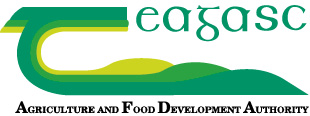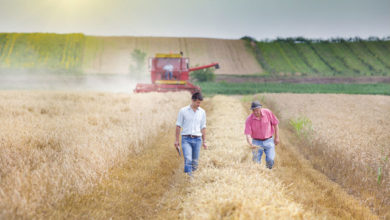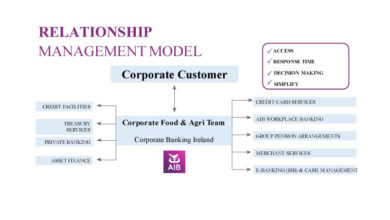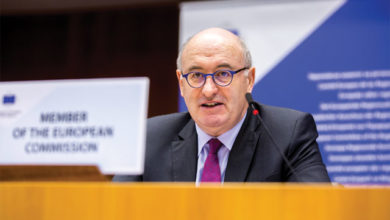Driving innovation in agri-food


Agriculture faces significant challenges in the coming decades. It must produce more food for a growing, increasingly affluent global population that requires a more diverse, protein-rich diet. But, it must vie for access to increasingly scarce natural resources, preserving biodiversity, water and soil quality, restoring fragile ecosystems and mitigating the effects of climate change.
Teagasc, the Irish agriculture and food development authority, works to meet the knowledge and technology needs of the entire food chain through integrated research, advice and education services to deliver innovation support to add value to Ireland’s agri-food sector.
Ireland’s agriculture and food industry is ambitious. Those ambitions are spelled out in the Food Wise 2025 strategy for the sector. Growth targets to increase the value of agri-food exports by 85 per cent to €19 billion have been set. The primary production sector plans to grow by 65 per cent to almost €10 billion while creating additional direct and indirect jobs for the Irish economy. All involved in Irish agriculture and Irish food and making strides towards those targets.
For Teagasc’s part, it is looking at the continuous development and application of new technologies. These will be needed to increase the productivity and competitiveness of Irish farms and enterprises, but they will also be needed to assist agriculture and food companies to protect the environment and mitigate and adapt to climate change. The Teagasc Technology Foresight 2035, will be crucial in guiding the development of the new tools and techniques that will help to address the particular challenges of climate change and wider sustainability concerns, while promoting efficiency and competitiveness.
“For Teagasc’s part, it is looking at the continuous development and application of new technologies. These will be needed to increase the productivity and competitiveness of Irish enterprises, but they will also be needed to assist agriculture and food companies to protect the environment and mitigate and adapt to climate change.”
Technical advice and education for farmers
Up skilling and increasing the knowledge base of farmers is critical to meeting the challenges that lie ahead. Smart agriculture is being driven on farms through the greater integration of ICT into all aspects of farming. The flow of data is increasing and farmers are continuously being challenged to make better use of ‘big data’ to inform the decisions they are taking at farm level. Greater training in financial management, resource efficiency and information technology are all required and are being built into the education courses offered by Teagasc at level 5 and level 6 in the agricultural and horticultural colleges and in the distance education and part time education courses available to farmers.
Through the advisory service, Teagasc are in contact with some 80,000 farmers and rural dwellers each year, of whom approximately 45,000 avail of an intensive farm consultancy service. The advisory service supports innovation by farmers in the management of their businesses and provides access to the technologies they can apply to improve their competitiveness. The extension of the discussion group model across different sectors as an effective means of knowledge transfer has been a positive initiative over the last five years, with the numbers of participating farmers increasing annually.
Research excellence
The advisory and education services are underpinned by the Teagasc research portfolio which comprises some 300 research projects annually undertaken by 500 scientific and technical staff. Given the large resources absorbed in research, Teagasc collaborates with other organisations both in Ireland and internationally to leverage the collective resources, expertise and knowledge for the betterment of Irish agriculture. Teagasc collaborate extensively with our colleagues in Irish institutes of higher education. Our Walsh Fellowships post-graduate programme supports more than 250 Ph.D. and M.Sc. students annually and enhances this collaboration. The Walsh Fellowship Programme provides a steady stream of highly qualified professionals, who go on to play leading roles in the agriculture and food sector at home and abroad.
Through EU research programmes, Teagasc has been successful in developing bilateral agreements with research organisations in Europe, the USA, Canada, South America, New Zealand, Africa, and also with a number of the Consortium for International Agricultural Research Centres (CIGAR).
Brexit challenge
There are serious implications for the Irish agri-food industry from the UK’s decision to exit the European Union. Its immediate impact is to have created uncertainty which has affected trade. It also has had an immediate impact on the exchange rate between sterling and the euro which has reduced the market returns and competitiveness of Irish exports into the UK. Ireland is the 33rd largest exporter in the world and the UK is our single biggest trading partner. Total Irish merchandise exports in 2014 were valued at €92 billion, of which almost €13.6 billion were exports to the UK. Irish agri-food exports to the UK make up approximately one third of the country’s total merchandise exports to the UK. In 2014, total Irish merchandise imports were valued at €61 billion, of which almost €20.6 billion were from the UK. Of that, the agri-food imports from the UK were worth €4.5 billion.
Outside of the impact on sterling, which fell to a 30-year low on the back of the Brexit result, it is not clear how much trade can continue between Ireland and a UK outside the EU. Teagasc has estimated that a Brexit could mean a reduction in the value of Irish agri-food exports of anything from €150 million (1.5 per cent) to €800 million (7.2 per cent) per annum.
Dairy and beef
The two largest farming enterprises in Ireland are dairy and beef. A substantial portion of the national output of beef and dairy products are destined for the UK market. Given our land border with Northern Ireland, the industries are integrated and criss-cross the border, with products collected from farmers on both sides and processed in facilities also located on both sides. How these Brexit related issues are resolved, will remain to be seen.
But in broad terms the key for both beef and dairy farmers to survive the impacts of market shocks and trade disruption is to have a robust low cost production model. In Ireland’s case, that means producing milk and beef cost effectively from grazed grass. Our grass-based ruminant livestock system is our greatest comparative advantage as a trading nation. A key challenge is to increase the level of grass utilised from 7.4 tonnes of dry matter per hectare on average to 10 tonnes DM/Ha. So for dairy and beef farmers the priority has to be to increase the level of grass used in the animal’s diet. This will ensure their business survive and prosper and with that the competitiveness of the sector.
Contact
Web: www.teagasc.ie
Tel: +353 (0) 59 917 0200
Email: gerry.boyle@teagasc.ie






